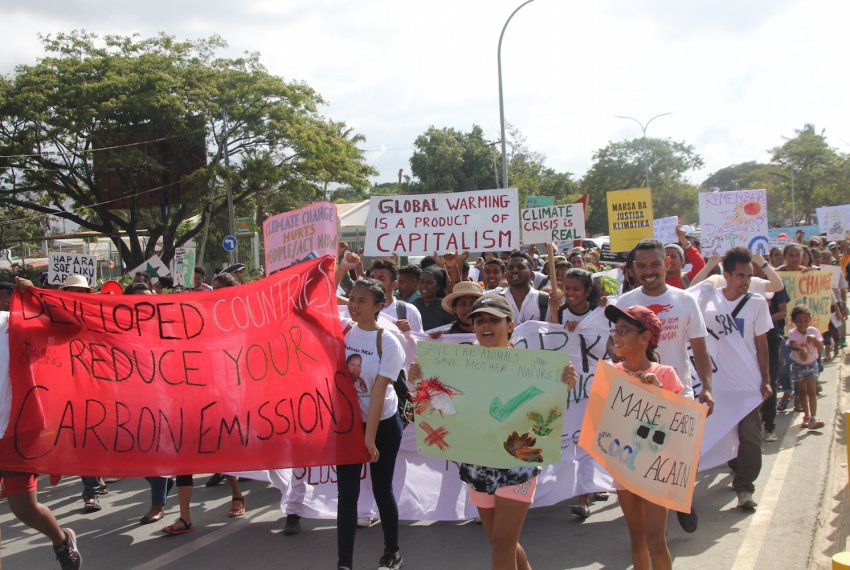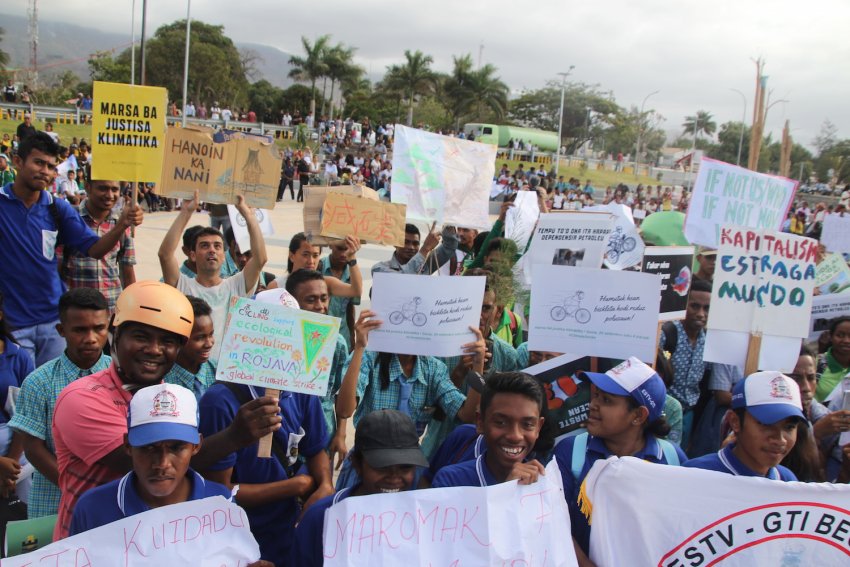
Timor-Leste joined the global climate strike for the first time, on September 24.
More than 400 people took part in the climate strike in the capital, Dili. The protest stared from the Palacio Governo, marching to Bidau for speeches and a concert.
High school students, environmental activists and members of the Dili Cycling Group spoke at the rally. The Timorese secretary of state for the environment also addressed the rally.
Timor-Leste is seventh on a global list of countries most prone to natural disasters. The clear evidence of a changing climate and unpredictable weather conditions include longer dry seasons, more droughts, flooding and landslides, and increasing coastal erosion.
Farmers, amongst the poorest people in Timor-Leste, are experiencing crop losses, water scarcity, food insecurity, reducing their income and increasing hunger. The impact on livelihoods results in children being removed from school and increased migration to the cities.
The climate crisis is placing Timorese farmers and households, already living in poverty, under extreme pressure.
Protesters called on the government to:
• Reinforce the law on phasing out the importation and sale of single-use plastic and invest in developing the infrastructure to provide safe drinking water for everyone.
• Commit to and invest in sustainable renewable energy production.
• Ensure there are environmental assessments and management plans for all new public and commercial infrastructure projects, and enforce strict environmental laws for implementation that do not impact negatively on people’s lives and land.
• Develop an accessible, inexpensive public transport system for all areas in Timor-Leste.
• Invest, promote and support sustainable projects to protect the environment and for sustainable land management,including using permaculture techniques and culturally appropriate approaches for conservation such as Tara Bandu (the traditional laws governing the management of natural resources).
• Integrate climate adaptation and disaster risk-reduction approaches into all agriculture and development work.
• Budget for and implement the National Adaptation Program of Action on Climate Change.
• Establish a national Early Warning System for slow and rapid-onset disasters, from national to local levels, which is accessible for all and considers local traditional knowledge.
• Ensure government disaster management systems and structures at the national and municipal level are functioning and are inclusive of women and persons with disabilities.
• Recognise that women, girls and vulnerable groups, such as persons with disabilities, are the most affected by the climate crisis, and so they need specific services and programs to support them.
Protesters called on international governments to:
• Honour the Paris Agreement to keep global temperatures below 1.5°C, through producing or revising their national plans to reduce greenhouse-gas emissions by 45% over the next decade.
• Consider that most developed countries, such as Australia, Brazil, India, Russia, China and the United States, have greater responsibility for causing the climate crisis, while Timor-Leste and other developing countries are feeling its effects the most on the climate frontline. Thefore, developed countries should: take the lead in reducing their emissions; support developing countries by financing, sharing technology and building capacity to help adaptation and to strengthen resilience; assist developing countries to reduce their future emissions through sharing technology, and financing zero emissions renewable energy and low-carbon agriculture; and work together using the principles of equity, mutual respect, and climate justice.
